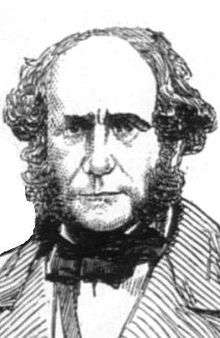Hugh Alexander Kennedy
| Hugh Alexander Kennedy | |
|---|---|
 H. A. Kennedy | |
| Full name | Hugh Alexander Kennedy |
| Country | England |
| Born |
22 August 1809 Madras, India |
| Died |
22 October 1878 (aged 69) Reading, England |
Hugh Alexander Kennedy (22 August 1809 – 22 October 1878) was an English chess master[1] and writer.[2]
Chess career
Hugh Alexander Kennedy was born in Madras, India in 1809.[3] He was a former British army captain and leading London chess player. He established the first chess club in Brighton in 1842.[4] In 1844, he lost a match to Howard Staunton (3–8).[5] In 1845, he teamed up with Staunton in Portsmouth in two telegraph games (lost and drew) against a team of Henry Thomas Buckle, George Walker, William Davies Evans, Perigal, and Tuckett in London.[6][7] He lost a match to Elijah Williams (+2 –4 =0) in 1846 and lost a match to Edward Löwe (+6 –7 =1) in 1849, both in London.[8]
Kennedy played in the great international London 1851 chess tournament and finished in sixth place of the sixteen competitors. He knocked out Carl Mayet in round 1 with two wins. In round 2, he lost to Marmaduke Wyvill (+3 –4 =1). In round 3, he defeated James Mucklow with four wins. Finally, he lost to József Szén (+0 –4 =1).[9]
In 1862, Kennedy lost perhaps the first international telegraphic game, against Serafino Dubois.[10]
Kennedy died in Reading, England, in 1878.[1]
"Napoleon" game
In the story "Some Reminiscences of the Life of Augustus Fitzsnob, Esq." (inspired by Thackeray's The Book of Snobs), Kennedy gave the score of a chess game said to be played by Napoleon and Count Bertrand.[2] First published in 1860, it was later included in Waifs and Strays (2nd edition, 1876), a collection of Kennedy's writings.[2] It has been erroneously cited as a true Napoleon game many times since, although it is actually the score of a game between Kennedy and John Owen.[2]
This is the score given by Kennedy in the two-column notation that was common at the time,[11] and in modern algebraic notation.
| a | b | c | d | e | f | g | h | ||
| 8 |  | 8 | |||||||
| 7 | 7 | ||||||||
| 6 | 6 | ||||||||
| 5 | 5 | ||||||||
| 4 | 4 | ||||||||
| 3 | 3 | ||||||||
| 2 | 2 | ||||||||
| 1 | 1 | ||||||||
| a | b | c | d | e | f | g | h | ||
Napoleon Bertrand Algebraic notation 1. P to K fourth 1. P to K fourth 1. e4 e5 2. Kt to K B third 2. Kt to Q B third 2. Nf3 Nc6 3. P to Q fourth 3. Kt takes P 3. d4 Nxd4 4. Kt takes Kt 4. P takes Kt 4. Nxd4 exd4 5. K B to Q B fourth 5. K B to Q B fourth 5. Bc4 Bc5 6. P to Q B third 6. Q to K second 6. c3 Qe7 7. Castles 7. Q to K fourth 7. 0-0 Qe5 8. P to K B fourth 8. P takes P (dis. check) 8. f4 dxc3+ 9. K to R square 9. P takes P 9. Kh1 cxb2 10. B takes K B P (check) 10. K to Q square 10. Bxf7+ Kd8 11. P takes Q 11. P takes R (Queening) 11. fxe5 bxa1=Q 12. B takes Kt 12. K B to K second 12. Bxg8 Be7 13. Q to Q Kt third 13. P to Q R fourth * 13. Qb3 a5 And Napoleon forces mate in five moves (see diagram)
* Kennedy writes of Black's thirteenth move: "This seems a courtier-like move on the part of Count Bertrand. He ought now have taken P at K fifth with Q, having the exchange and two Pawns in return for a formidable attack."
Writings
- Kennedy, Captain H. A. (January 1860), "Some Reminiscences in the Life of Augustus Fitzsnob, Esq.", The Chess Monthly, 4, pp. 1–11
- Kennedy, Captain Hugh A. (1876), Waifs and Strays, Chiefly from the Chessboard (2nd ed.), London: W. W. Morgan
References
- 1 2 Gaige, Jeremy (1987), Chess Personalia, A Biobibliography, McFarland, p. 209, ISBN 0-7864-2353-6
- 1 2 3 4 Hooper, David; Whyld, Kenneth (1992), The Oxford Companion to Chess (2 ed.), Oxford University Press, p. 197, ISBN 0-19-280049-3
- ↑ "India, Births and Baptisms, 1786-1947," index, FamilySearch (https://familysearch.org/pal:/MM9.1.1/FG48-1WL : accessed 22 February 2015), Hugh Alexander Kennedy, 02 Oct 1809; citing , reference v 11 p 225; FHL microfilm 521,839.
- ↑ Hoevestadt, Leo, The Brighton Chess Club: Introduction and Background to the Formation of the First Club, Carolus Chess. Other references give 1840 as the year of formation, including Eales, Richard (1985), Chess: The History of a Game, Batsford, p. 141, ISBN 0-7134-4607-2.
- ↑ Edo Ratings, Kennedy, H.A
- ↑ http://www.chesscafe.com/text/spinrad15.pdf
- ↑ The Kibitzer
- ↑ matches fino 1849
- ↑ 1851 London Tournament
- ↑ The chess games of Hugh Alexander Kennedy
- ↑ Waifs and Strays, p. 37
Further reading
- The Times, 28 October 1878, p. 1. c. 1
- British Chess Magazine, 1878, p. 473
- Chess Player's Chronicle, 1878, pp. 270–271
External links
- Hugh Alexander Kennedy player profile and games at Chessgames.com